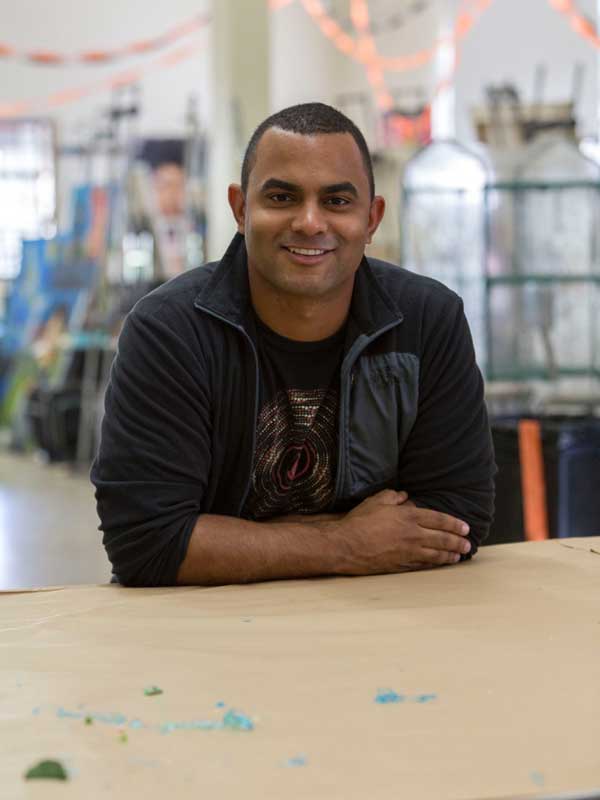Christian Morris

Having dropped out of high school twice, Christian Morris said he always felt that he just wasn’t any good at school.
“I was good at sports so I made that my rebellion against feeling stupid,” Morris, 25, said.
Years later, Morris is set to graduate from CI in December after spending the summer in a prestigious artist-in-residence program near his hometown of Leetsdale, Pa.
Morris was chosen from a national list of candidates for the 2016 Judy Cheteyan Internship Award at the Society for Contemporary Craft in Pittsburgh.
A project he did on a historic and character-rich part of the city called “The Strip” is currently on display at the Society of Contemporary Craft gallery next to internationally-recognized ceramic artist Edward Eberle.
Morris spent the summer of 2016 as an artist-in-residence while creating his multimedia project, “Practices in Listening.”
For the project, Morris gathered the character of The Strip by interviewing business owners, waitresses, visitors, and others. Then, he incorporated segments from the recorded interviews into an interactive “map” of ceramic speakers.
“I connected those interviews to sculptures with a QR code,” he said. “So a person could put a phone up to it and hear a story about the place.”
One of his favorite interviews was with a glassmaker who installed windows. If someone didn’t pay, the glassmaker would wait until the coldest day of winter and remove the glass from the front of the store.
“In the middle of the day we would come up and cut out the glass and take it,” Morris said, laughing. “They’d call them up and say ‘You want your glass back? You have to pay us.’ It was like this innocent gangster move.”
Finding his calling was a circuitous process for Morris, and punctuated with tragedy. But because of mentors along the way, Morris’ future as an artist and writer looks promising.
Among the people who nurtured Morris’ talent were CI Arts Lecturer Amiko Matsuo and Professor of English Brad Monsma, Ph.D.
“One of Christian’s many gifts is ‘listening,’ and listening leads him to community engagement,” Matsuo said. “These deep connections with people form the foundation for his insightful and expansive approach as a ceramic artist.”
It was in Matsuo’s ceramics class that Morris first developed the idea for “The Strip” project, and at her suggestion, pitched it for the 2016 Judy Cheteyan internship.
Having grown up on the wrong side of the tracks and gone to school with children of wealthy steel barons, Morris always felt that he was on the outside looking in. He never expected to earn the internship over students who attended Carnegie Mellon University (CMU).
“Amiko wanted me to try for the residency, but I did not want to do it because everybody who ever got it was from CMU,” he said.
It was a triumph he never expected after his complicated childhood. Morris grew up with five brothers and three sisters, some of them half-siblings. Morris’ life changed six days before his 13th birthday, when his older brother committed suicide at the age of 25.
“The brother who believed in me died,” Morris said.
Morris’ parents’ marriage didn’t survive the tragedy. They divorced, and his mother moved Morris and his siblings into a house badly in need of repairs in an industrial yard.
After his brother’s suicide, Morris felt his foundations crack and dropped out of school in the ninth grade, opting for cyber-school, which he also dropped.
A wealthy schoolmate took Morris under his wing and helped him master a piano piece so he could get into a performing arts high school, which he did.
He dropped out again. “I was super, super depressed,” Morris said.
Morris finally earned his GED, but his mother was afraid for Morris and his future.
Morris’ great-uncle and aunt, Jim and Jill McCrory, happened to be visiting Pittsburgh from their home in Camarillo at the time Morris left school. Morris’ mother asked if Morris could live with them and make a new start in California.
“He and my Aunt Jill agreed and totally changed the trajectory of my entire life,” Morris said. “They are superhumans with super hearts.”
He began attending Ventura College and Moorpark College, where he discovered a love of ceramics. He got A’s in every subject.
When he transferred to CI, Matsuo and Monsma recognized Morris’ commitment and encouraged him.
“Amiko and I used to have long conversations about art and meaning, and until then I didn’t know what art was about,” Morris said.
Currently, Monsma is working with Morris on a creative nonfiction project in which Morris is writing about his life growing up in a rusting industrial park.
“Christian’s writing raises questions about toxicity and power, about how places affect the trajectories of people’s lives,” Monsma said. “He’s grounding his personal history with ideas about environmental justice and vibrant matter, which is to say he’s using theory to make meaning with his stories. That’s how many environmental writers try to change the world for the better.”
